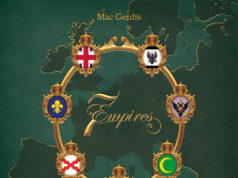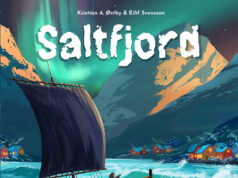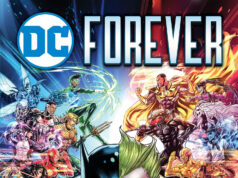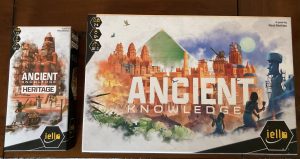 It’s pretty rare when a game introduces a new mechanism into a tried and true format. Think about a tableau builder. You place cards into a tableau, you get the benefits of the card, maybe as a one-time benefit, maybe as an ongoing effect or an end-game score. But sometimes a game shakes the paradigm up.
It’s pretty rare when a game introduces a new mechanism into a tried and true format. Think about a tableau builder. You place cards into a tableau, you get the benefits of the card, maybe as a one-time benefit, maybe as an ongoing effect or an end-game score. But sometimes a game shakes the paradigm up.
What if the cards in your tableau moved over time and their benefit changed as they moved? What if the primary costs to play the cards are also negative points at the end of the game? But what if the more negative points you acquire, the stronger your actions get? That game sounds pretty cool, doesn’t it?
That’s Ancient Knowledge, designed by Rémi Mathieu with art by Pierre Ples, Adrien Rives, and Emilien Rotival, and published in the USA by IELLO. And now Monsieur Mathieu and team have offered up a new expansion, called Ancient Knowledge: Heritage that provides new effects and new ways to play.
Gameplay Overview
In some respects, Ancient Knowledge is a bog-standard tableau builder with mechanisms that any gamer will recognize. On your turn, you get two actions and you choose from a menu of five possible options, four of which are just what you’d expect, involving drawing fresh cards, playing cards into your tableau, etc. The fifth action lets you remove negative point markers. So far, ho hum.
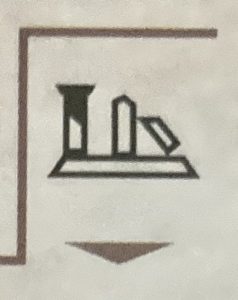
Where Ancient Knowledge subverts the standard conception of a tableau builder is what makes it stand out. Players have a multi-positional tableau where they can place different types of cards. While some types of cards stay in place, your primary cards, which the game calls “Monuments” go into a spot on your tableau called the “Timeline.” As you place Monuments into your Timeline, you add knowledge tokens (from the supply) to the cards, which is where things get interesting. At the end of each turn, all of the cards in your Timeline shift to the left, and as they hit the end of the progression, they “Fall into Decline” – which makes them eligible for end-game points but also serves as the timer for the game to end.
If those cards still have any knowledge tokens on them, those tokens remain on your board as negative points (representing “lost knowledge”), unless/until you find ways to remove them.
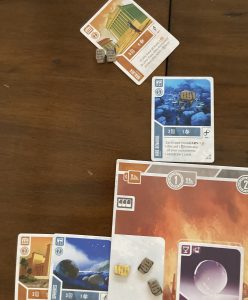
Once one player has seven Monuments in their past, there is a sort of mid-game adjustment so that more powerful end-game cards start to show up. Once one player has 14 Monuments in their past, they finish the round and move to the final scoring.
Scoring is a bit of a point salad, but the biggest focus is the point value on cards you’ve acquired, and then the negative impact of all of that lost knowledge your great Monuments slipped into decline and your civilization lost its ancient knowledge.
New players to Ancient Knowledge tend to focus very hard on cost-minimizing strategies. After all, it’s pretty clear that having a lot of lost knowledge at the end of the game is going to trash your score. But more advanced players who have seen how the game’s cards interact begin to realize that there is power in lost knowledge, because (a) the cards with a high potential for lost knowledge are usually also worth the most points at the end of the game, and (b) there are powerful cards that can only trigger if you have accumulated a lot of lost knowledge. It’s a classic example of needing to spend money to make money, or in this case, lose knowledge to gain knowledge.
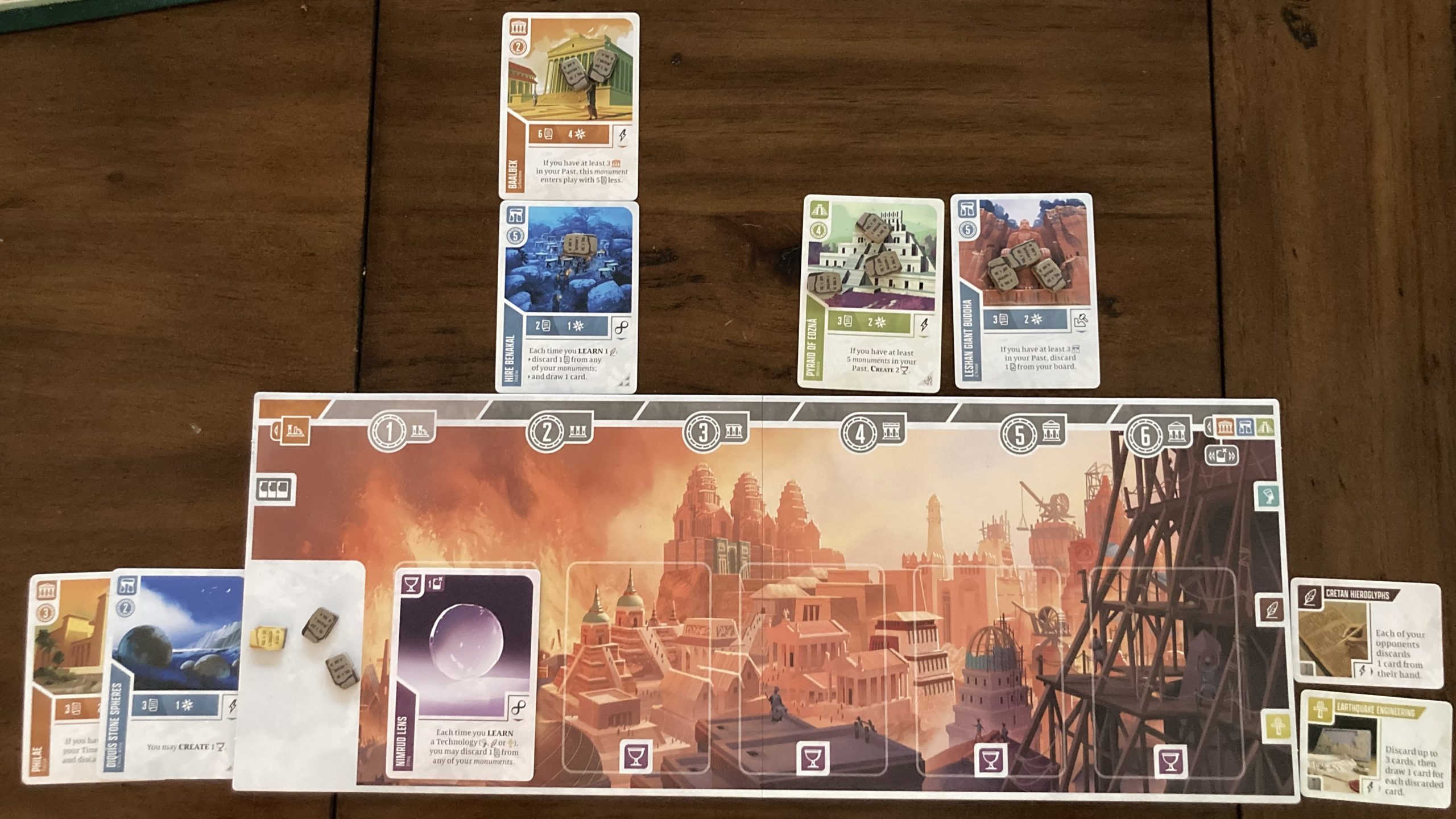
Game Experience
As mentioned above, many of the actions in Ancient Knowledge are pretty standard. You can (1) play a full-sized card from your hand (“create”), (2) draw one of those same cards blind from a deck (“search”), (3) trigger an effect that lets you draw more than one card (“excavate”), or (4) play a different type of (half-sized) card from an open market on the table (“learn”). Only the fifth is keyed into the game’s unique mechanism, in that you can discard cards to remove current knowledge from your tableau (via the “archive” action), which then lowers the amount of knowledge that is available to be lost when that Monument falls into decline.
Some cards have an additional cost (beyond the knowledge mechanism) in that you will need to discard cards to play them, and you also generally have the flexibility to play cards at their base cost into a certain spot on your timeline or to spend extra cards to move them to a different position. So having a nice full hand rewards you with options, and also with the ability to play more flexibly. This is why you will want to draw cards, but the basic way to do this, using “search” is a great way to fall behind your opponents.
The rules tell you to avoid using search if possible—using 50% of a turn just to blindly draw one card is pretty weak. This can be avoided by triggering card draws by other means—using an effect on your cards or (once the game has progressed a bit) taking advantage of the excavate action, which lets you tap your Monuments already in decline, and draw two cards per. Other cards will let you reset these tapped cards, so if executed efficiently, you can keep your hand close to full (ten cards maximum) without doing much, if any, of the search action.
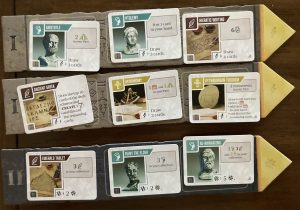
Using the Learn action adds a lot of oomph to the game as well. Separate from the standard-sized cards that provide you with monuments (and also special permanent effect cards called “Artifacts”), smaller technology cards are available from a common (open-faced) market. Cards are free if you meet the prerequisite, and as you acquire them, they accumulate to the side of your tableau. Monuments and Artifacts can trigger effects based on your technology and the more powerful technologies provide a nice slug of end-game points. And true to the game’s strengths, some of the best technologies can only be acquired if you have a big cache of lost knowledge sitting on your board, dragging down your score.
Play proceeds briskly as long as you avoid inviting your A/P-prone friends over. If someone decides to invest 5 minutes per turn in this game, they are doing it wrong and ruining it for everyone else. More than many Euros I play, I would strongly recommend everyone agree in advance that this is a “react quick” game not a “min/max in agony” experience, and if need be, break out the kitchen timers to prevent someone from ruining the experience for everyone. If you share that common understanding, Ancient Knowledge is pretty awesome. It offers a lot of strategy while keeping the tactical decision space small, and it feels like a Civ game despite being pretty much just a tableau builder.
But let’s also talk about the new expansion, Ancient Knowledge: Heritage. This comes in a small box and all of the contents will fit into your base game, if you don’t feel the need to keep extra expansion boxes. Inside the small box are a bunch of new cards and a speckled six-sided die. Most of the cards are just extra Monuments and Artifacts that you can shuffle right into your base game and just play the game the way you always have. The rest provide various mechanisms to let you play a solo game with distinct challenges.
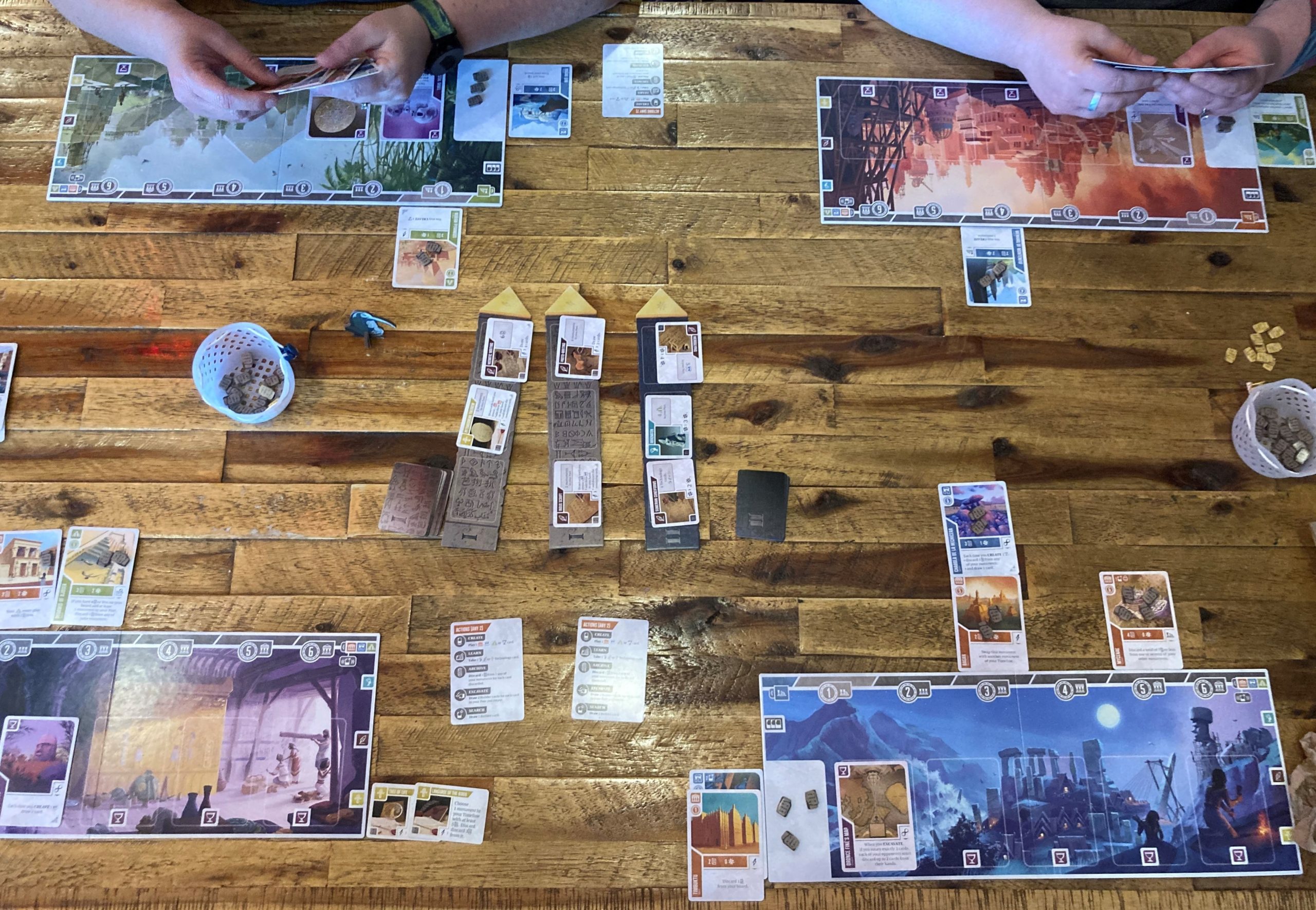
Expansion Content
As much as I like Ancient Knowledge, I am not a big fan of the Heritage expansion. The new Monuments and Artifacts are fine, but they generally make the game’s decisions more complex because instead of featuring one effect, they often feature two, and each triggers at a different point in the game. All of the folks playing with me were experienced with the base game and felt suddenly like the ability to make a snap decision and play with pace stopped once the cards offered multiple uses. And since Ancient Knowledge lives or dies by whether people are willing to play it without A/P, adding several doesn’t A/P triggers into the deck really degraded the experience for us.
If you are playing this game one move per day, the new cards will add fun variety and the slowed pace won’t matter. But as a live game experience, it feels a little like it overburdens a game that was well-suited for quick play and bogs things down without adding enough payoff.
The solo game is fine and the mechanisms that drive it are quite clever, but playing Ancient Knowledge as a solo game also suffers from the problem of pace. The solo game offers two modes, Heritage or Challenge. Challenge Mode involves increasingly tough goals to meet over the course of the game, essentially a fresh game every time. Heritage Mode is more of a campaign, and the game provides you with good ways to save your game between sessions. Both modes take advantage of new Chest cards, which can be unlocked during a session and provide rewards when you do.
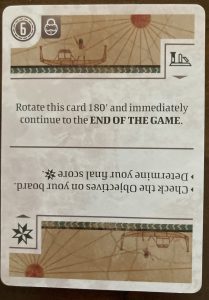
But here’s the thing. The solo game is far more fiddly than playing with other people. When you play the game live, your opponents are keeping you honest, so if you forget to pay your knowledge cost or if you trigger an effect at the wrong time, someone is going to notice and course correct before things go astray. But playing solo, it’s all on you and suddenly it becomes a whole lot clearer how cumbersome the game’s physical upkeep costs are. Indeed, since I started playing the solo version for this review, it’s made me less eager to get the game to the table for multiplayer play, because it focused my attention more on the bones of the game and broke the magic spell that made the mechanisms feel fun. Of course, I’ll get over that by playing more multiplayer, but the solo mode (at least temporarily) has made me like the game less.
Final Thoughts:
I think Ancient Knowledge is fantastic when the circumstances of play align properly. I love the interconnecting card mechanism and the way the game thrusts important tradeoffs between cost and benefit into the front of your decision space. And I also like how each turn is itself short and tactical so that strategies develop over the long run of a series of short, focused moves.
But I have played this game with people with A/P, and boy howdy, things break down in a hurry. If I have time to go get a beer and come back and you are still pondering whether to draw one card by searching or two cards by excavating, we are not going to have a fun time playing Ancient Knowledge. So I keep this in the bag but if I see those people I know can’t help themselves, I do not bring it out as an option.
If you’re the kind of person who reads game reviews, you know this type of player. Maybe it’s you. If your game group features long, overly pondered moves where the potential benefit of the better choice is fairly minimal, I cannot recommend Ancient Knowledge. But if you have a crew that can accept a mistake or two in the service of a fun, quick game with nice strategic options, then I really think you’ll end up loving Ancient Knowledge. Know thyself!
Final Score: 4 Stars – The base game is a great time, but leave the expansion on the shelf.
 Hits:
Hits:
• Adds fun, unique mechanisms to an “it’s all been done before” genre.
• Players who buy into the pace can play a peppy, thinky game.”
• Offers a depth of strategy in a game with short, tactical decisions.
• You can try it out on BGA and develop a taste for it before adding it to your collection.
Misses:
• Do not play with your A/P-prone game friends.
• Think hard before adding the expansion content to multiplayer games, as it slows things down.
• The solo game is a bit of a slog, and falls into the same trap as an A/P-plagued multiplayer game.









